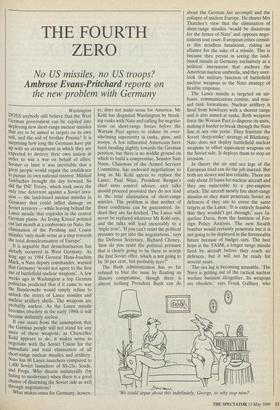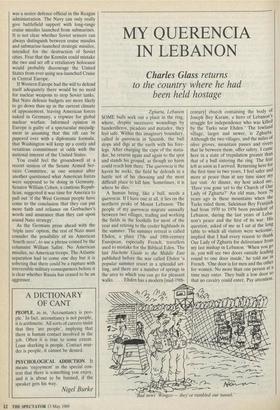THE FOURTH ZERO
No US missiles, no US troops?
Ambrose Evans-Pritchard reports on
the new problem with Germany
Washington DOES anybody still believe that the West German government can be cajoled into deploying new short-range nuclear missiles that are to be aimed at targets on its own soil, and the soil of brother Prussia? It is surprising how long the Germans have put up with an arrangement in which they are expected to destroy their own nation in order to win a war on behalf of allies. Sooner or later it was inevitable that a great people would regain the confidence to pursue its own national interest. Mikhail Gorbachev brought the day forward. So did the INF Treaty, which took away the only true deterrent against a Soviet inva- sion — the land-based nuclear missiles in Germany that could inflict damage on Soviet territory — while leaving behind the Lance missile that explodes in the central German plains. As Irving Kristol pointed out last month at a conference on Nato, the elimination of the Pershing and Cruise missiles 'only made sense as a step towards the total denuclearisation of Europe'. It is arguable that denuclearisation has already occurred in West Germany. As long ago as 1984 General Hans-Joachim Mack,' a Nato deputy commander, warned that Germany 'would not agree to the first use of battlefield nuclear weapons'. A few weeks ago in Washington a top German politician predicted that if it came to war the Bundeswehr would simply refuse to unlock the stores of Lance missiles and nuclear artillery shells. The weapons are Probably useless. As the Lance missile becomes obsolete in the early 1990s it will become definitely useless. If one starts from the assumption that the German people will not stand for any more of these weapons, as Chancellor Kohl appears to do, it makes sense to negotiate with the Soviet Union for the immediate and total elimination of all short-range nuclear missiles and artillery. Nato has 88 Lance launchers compared to 1,400 Soviet launchers of SS-21s, Scuds, and Frogs. Why disarm unilaterally (by failing to modernise) when there is a good chance of disarming the Soviet side as well through negotiations? What makes sense for Germany, howev- er, does not make sense for America. Mr Kohl has disgusted Washington by break- ing ranks with Nato and calling for negotia- tions on short-range forces before the Warsaw Pact agrees to reduce its over- whelming superiority in tanks, guns, and troops. A few influential Americans have been bending slightly towards the German position, but there is no middle ground on which to build a compromise. Senator Sam Nunn, Chairman of the Armed Services Committee, has endorsed negotiations so long as Mr Kohl agrees to replace the Lance. Paul Nitze, President Reagan's chief arms control adviser, says talks should proceed provided they do not lead to the total elimination of short-range missiles. The problem is that neither of these conditions can be guaranteed. In- deed they are far-fetched. The Lance will never be replaced whatever Mr Kohl says, and the talks will lead inexorably to a `triple zero'. 'If you can't resist the political pressure to get into the negotiations,' says the Defense Secretary, Richard Cheney, `how do you resist the political pressure that is clearly going to be there to accept the first Soviet offer, which is not going to be 50 per cent, but probably zero?'
The Bush administration has so far refused to blur the issue by floating an illusory compromise, though there is almost nothing President Bush can do about the German fait accompli and the collapse of nuclear Europe. He shares Mrs Thatcher's view that the elimination of short-range missiles 'would be disastrous for the future of Nato' and opposes nego- tiations tout court. European critics consid- er this mindless fanaticism, risking an alliance for the sake of a missile. This is because they persist in seeing the land- based missile in Germany exclusively as a political instrument that anchors the American nuclear umbrella, and they over- look the military function of battlefield nuclear weapons in the Nato strategy of flexible response.
The Lance missile is targeted on air- bases, communications centres, and mas- sed tank formations. Nuclear artillery is fired from howitzers with a shorter range and is also aimed at tanks. Both weapons force the Warsaw Pact to disperse its units, making it harder to break through the Nato line at any one point. They frustrate the Soviet 'deep-strike' strategy of Bliztkrieg. Nato does not deploy battlefield nuclear weapons to offset equivalent weapons on the Soviet side. It deploys them to stop an invasion.
In theory the air and sea legs of the European triad can do the job instead. But both are slower and less reliable. There are only about 20 bases for nuclear aircraft and they are vulnerable to a pre-emptive attack. The aircraft mostly fire short-range missiles so they must penetrate Soviet air defences if they are to cover the same targets as the Lance. 'It is entirely feasible that they wouldn't get through,' says Ja- queline Davis, from the Institute of For- eign Policy Analysis. The new Stealth bomber would certainly penetrate but it is not going to be deployed in the foreseeable future because of budget cuts. The best hope is the TASM, a longer range missile fired by aircraft before they reach air defences, but it will not be ready for several years.
The sea leg is becoming unusable. 'The Navy is getting out of the tactical nuclear warfare business altogether. Its weapons are obsolete,' says Frank Gaffney, who We could argue about this indefinitely, George, so why stop now? was a senior defence official in the Reagan administration. The Navy can only really give battlefield support with long-range cruise missiles launched from submarines. It is not clear whether Soviet sensors can always distinguish between cruise missiles and submarine-launched strategic missiles, intended for the destruction of Soviet cities. Fear that the Kremlin could mistake the two and set off a retaliatory holocaust would probably discourage the United States from ever using sea-launched Cruise in Central Europe.
If Western Europe had the will to defend itself adequately there would be no need for nuclear weapons to stop Soviet tanks. But Nato defence budgets are more likely to go down than up in the current climate of appeasement, leaving American forces naked in Germany, a tripwire for global nuclear warfare. Informed opinion in Europe is guilty of a spectacular misjudg- ment in assuming that this rift can be papered over with a diplomatic formula, that Washington will keep up a costly and vexatious commitment at odds with the national interest of the United States.
You could feel the groundswell at a recent session of the Senate Armed Ser- vices Committee, as one senator after another questioned what American forces were supposed to be doing in Germany. Senator William Cohen, a cautious Repub- lican, suggested it was time for America to pull out 'if the West German people have come to the conclusion that they can put more faith and reliance on Gorbachev's words and assurance than they can upon sound Nato strategy'.
As the Germans press ahead with the 'triple zero' option, the rest of Nato must consider the possibility of an American 'fourth zero', to use a phrase coined by the columnist William Safire. No American missiles, no American troops. The Atlantic separation had to come one day but it is sobering that there could be a rupture with irreversible military consequences before it is clear whether Russia has ceased to be an aggressor.



























































 Previous page
Previous page